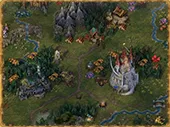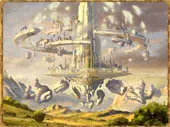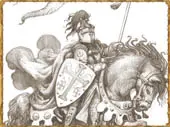Gamespot独家战役视频与制作人长篇Q/A
EvilP 更新于 2011-09-28 00:55
http://www.gamespot.com/pc/strategy/might-and-magic-heroes-vi/news/6336620/
http://v.youku.com/v_show/id_XMzA3ODUwNDAw.html
这QA长的要死,不知道会不会有心情译的出来……
- GameSpot: We`ve already had a chance to experience the blood and tears system in Heroes VI. Tell us more about this feature--why incorporate this system and what does it add to the game?
- Erwan Le Breton: With [Heroes VI], we really wanted to reinforce the already-important role-playing game facet of the game. We also wanted players to truly be able to build the hero characters that would reflect their most favorite style of play. So in Heroes VI, players are in complete control over the skills they can get for their heroes. When heroes level up, they receive skill points that the player can spend in various skill families. Also, the separate might and magic classes are returning for each faction, like in Heroes III and IV. On top of that, we are introducing a new system we call reputation. Time and again, players will be faced with a very important reputation choice between two different moral paths: the path of Dragon Tears and the path of Dragon Blood. This is not a good-versus-evil dichotomy but, rather, a dynamic concept of conflicting perspectives. Blood heroes will be proactive and focus on offense, while Tears heroes will be more reactive and defensive. Imagine, for instance, that your hero stumbles upon an innocent person being assaulted by a robber. The Blood hero will chase and attack the robber to prevent him from causing more harm. The Tears hero will interpose himself between the robber and the victim. He will try to intimidate or persuade the robber and comfort the victim. The reputation system is obviously intimately linked to the game`s overall story arc, but it also changes the appearance of your heroes and it grants them specific gameplay benefits. As such, reputation is also meaningful in multiplayer. Although reputation mechanics are also found in other games, we feel that by mixing story, graphics, and gameplay, our system is truly unique and something never before seen in a strategy game.
- GS: How much will the game experience change for players who decide to invest heavily in either alignment? Different item, skill, or magic spell unlocks, for instance?
- EL: In Heroes VI, players can evolve their heroes into advanced classes that have two unique abilities, including one ultimate ability. Access to these classes is not based on a specific combination of skills but, rather, on your reputation choices. Even simple actions on the adventuring map can change your reputation in Might & Magic: Heroes VI. For instance, a might hero from the haven faction will start as a knight and can later evolve into a paladin (Tears) or a vindicator (Blood). Your hero`s path will strongly influence your player`s experience. In terms of storytelling, it will unlock special quests on each campaign map, different companion heroes, and a unique epilogue map linked to your path. [Your alignment] will also grant you access to specific reputation abilities--there will be eight per faction--linked to the advanced classes. Another gameplay consequence of the reputation system is that most of the hero abilities are also defined by their affinity with one reputation path or the other. The higher your ranking in this path, the more powerful your related abilities become. For instance, healing (a light spell) will be influenced by your Tears rating, whereas fireball (a fire spell) will be influenced by your Blood rating. Finally, some of the rarest and most powerful artifacts in the game are reputation specific. Many quests will offer a reputation choice, and they will reward you with the appropriate reputation points. Most in-game actions will also award reputation points. For instance, if your enemies flee before your powerful army, choosing to let them escape will grant you Tears points. Chasing them down to kill them will give you Blood points. More generally, using Tears abilities will grant you Tears points, and the same goes for Blood. These gains are not mutually exclusive. Your Blood and Tears ratings are not codependent and you never lose the reputation points you`ve gained. When you reach a certain Blood or Tears threshold, you`re offered the choice of evolving into the corresponding advanced class.
- GS: How will the Blood and Tears alignment system affect a player`s experience with the persistent character information in Heroes VI`s online Conflux mode?
- EL: When creating your heroes, your initial choices (faction, gender, and affinity for either might or magic) are permanent, so they become persistent character information when transferred to your dynasty (the hero section of the Conflux online mode). This is not the case for reputation. Reputation was designed as a more organic measurement of your choices--something that you build up as you play and that you can change from one game session to another or even within the same mission. As such, your dynasty heroes are not defined by their reputation. Reputation will unlock powerful new skills that you can bring with you into battle.
- GS: We`ve seen that Heroes VI`s campaign seems even more focused on story and characters than the previous game. Why go in this direction? Is Heroes VI intended to lay the foundation for a larger story in future Might & Magic games?
- EL: The Might & Magic games have always been story driven. But we really wanted to push it further with Heroes VI. For that effect, we have built a team of five writers with different areas of expertise (story structure, integration with game and level design, dialogue writing, creativity, and so on). The story of Heroes V served as the foundation for its two add-ons and our other Might & Magic games: Dark Messiah, Clash of Heroes, and Heroes Kingdoms. Let`s just say that we`re being even more ambitious with the story of Heroes IV.
- GS: We`ve seen several elements of Heroes VI make direct references to other Ubisoft Might & Magic games (such as Clash of Heroes) through music, different unit types, and certain skills and abilities. Is it fair to say that Heroes VI is intended to unify all the elements (characters, story, lore, factions, and so on) of Ubisoft`s Might & Magic universe?
- EL: You may have noticed that the game is now called Might & Magic: Heroes VI. This refers to the fact that all our Might & Magic games will share the same universe (the world of Ashan) but also the same guidelines--the same commandments in a sense. This unification was already started with Heroes V, but you are right in saying that it is clearly more obvious with Heroes VI, considering that we can now make direct references to the various Might & Magic Ashan games that have already been published.
- GS: What`s next for the Heroes series after Heroes VI? Any chance of an expansion or a full-on sequel in the future? Branching out onto other platforms?
- EL: What I can tell you is that Might & Magic does not stop with Heroes VI. If I say any more than that, my nights will be haunted by hooded assassins, my days plagued by Raving Rabbids…I`ll be forced to wear the cursed red shoes that will make me Just Dance to death.
- GS: Finally, is there anything else you`d like to add about Might & Magic: Heroes VI? Without the product placement, please.
- EL: In spite of its long gestation period and the inevitable turbulence on the long way from concept to release, Heroes VI has been to us--Ubisoft and Black Hole Studios--a labor of love. Now that the precious gem is finally cut, shaped, and polished, we`re truly proud of it. We are especially honored that the game`s release coincides with the 25th anniversary of Might & Magic, and we hope that the fans of this legendary series, as well as the newcomers who saw the light and leaned closer to discover its source, will feel the passion we`ve poured into our craft!
- GS: Thanks, Erwan.




